A Mission of Love
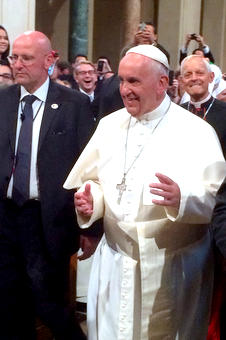 With words and gestures, in homilies and handshakes and hugs, Pope Francis shared a message of love and hope, respect and responsibility, during his Apostolic Journey to the United States. It was Christ’s teaching delivered with a Francis flair.
With words and gestures, in homilies and handshakes and hugs, Pope Francis shared a message of love and hope, respect and responsibility, during his Apostolic Journey to the United States. It was Christ’s teaching delivered with a Francis flair.
“The joy of the Gospel is something to be experienced, something to be known and lived only through giving it away, through giving ourselves away,” the pontiff said. “In God’s merciful plan, love and peace triumph over all.”
The pope’s visit was one full of firsts. It was the first time he had been in the United States. He is the first pope to ever address a joint session of Congress. During his visit, he canonized Junípero Serra, the first saint to be canonized on U.S. soil. And it was the first time the flag of the Holy See was raised to fly alongside the flags of the member states of the United Nations.
Expectations were high for the visit, but by most accounts, he exceeded them, his humility and gentle spirit warming the hearts of millions.
“The love that exuberates from the pope, you could just feel it. To be there, to hear him talk, to see him in person, it’s like, wow,” said Patricia Thibeault of All Saint Parish, Brunswick, who participated in a diocesan pilgrimage. “It was awesome. I just can’t say how awesome it was.”
“It brought tears to our eyes to see him, and a man next to me, I found out afterwards he was from Cambodia, after seeing the pope, we just embraced. It was beautiful,” said Rose Marie Vining, who attends Our Lady of Ransom Church in Mechanic Falls.
“I’m just overwhelmed with the love that I have for our pastor, for the Holy Father,” said Tracy Guerrette, who went on a pilgrimage with Saint Paul the Apostle Parish, Bangor. “He is the image of Christ on earth, and I got of a sense of that among all the people.”
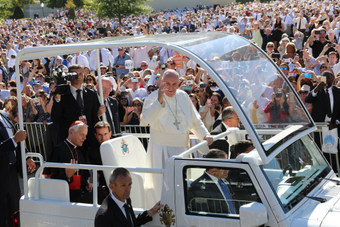 The pope’s visit to the United States spanned six days and three cities: Washington, D.C., New York City, and Philadelphia. The pope reflected on each of them this way: “In Washington, the welcome was warm but a little more formal; in New York, it was rather exuberant; in Philadelphia, it was heartfelt -- three different expressions but the same welcome.”
The pope’s visit to the United States spanned six days and three cities: Washington, D.C., New York City, and Philadelphia. The pope reflected on each of them this way: “In Washington, the welcome was warm but a little more formal; in New York, it was rather exuberant; in Philadelphia, it was heartfelt -- three different expressions but the same welcome.”
Each city has been the site of events that have shaped American history, something Pope Francis drew upon in many of his addresses. The pope steered a course through political divisiveness by reflecting upon the country’s foundational liberties and values.
“The challenges facing us today call for a renewal of the spirit of cooperation, which has accomplished so much good throughout the history of the United States,” he said in his address to Congress.
“All political activity must serve and promote the good of the human person and be based on respect for his or her dignity. ‘We hold these truths to be self-evident, that all men are created equal, that they are endowed by their Creator with certain unalienable rights, that among these are life, liberty, and the pursuit of happiness’ (Declaration of Independence). If politics must truly be at the service of the human person, it follows that it cannot be a slave to the economy and finance. Politics is, instead, an expression of our compelling need to live as one, in order to build as one the greatest common good: that of a community which sacrifices particular interests in order to share, in justice and peace, its goods, its interests, its social life,” the pope said.
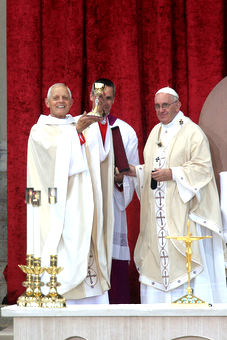 It was a message that resonated with Father Michael Seavey, pastor of the Portland Peninsula & Island Parishes, who attended the White House welcoming ceremony and the Congressional address.
It was a message that resonated with Father Michael Seavey, pastor of the Portland Peninsula & Island Parishes, who attended the White House welcoming ceremony and the Congressional address.
“Pope Francis opened before us a broad moral horizon large enough for everyone of goodwill to come under and work together. Those who are Catholic, other faith, or no faith; those who are rich, poor, or middle class; those native born, foreign born; those who are liberal, conservative, libertarian; all can work together within this wide horizon recognizing human dignity, the common good.”
During his congressional address, the pope focused on four Americans who, he said, shaped the country’s fundamental values: Abraham Lincoln, Dr. Martin Luther King, Jr., Dorothy Day of the Catholic Worker Movement, and Thomas Merton, a Trappist monk and writer.
The pope said the “dream” of Dr. King still inspires immigrants today.
“In recent centuries, millions of people came to this land to pursue their dream of building a future in freedom. We, the people of this continent, are not fearful of foreigners, because most of us were once foreigners. I say this to you as the son of immigrants, knowing that so many of you are also descended from immigrants.”
“I think he asks us to look at people as people, not as problems,” said Bishop Robert Deeley, who traveled to Washington and Philadelphia. “He talked about himself as a child of immigrants and that reminded many, many people, myself included, that we are children of immigrants. People come here for the opportunity of a better life.”
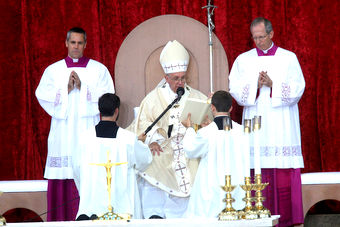 In his call for respect for all human life, the pope reminded members of Congress of the Golden Rule: ‘Do unto others as you would have them do unto you’(Mt 7:12).
In his call for respect for all human life, the pope reminded members of Congress of the Golden Rule: ‘Do unto others as you would have them do unto you’(Mt 7:12).
“Let us treat others with the same passion and compassion with which we want to be treated. Let us seek for others the same possibilities which we seek for ourselves. Let us help others to grow, as we would like to be helped ourselves,” the pope said. “If we want security, let us give security; if we want life, let us give life; if we want opportunities, let us provide opportunities. The yardstick we use for others will be the yardstick which time will use for us. The Golden Rule also reminds us of our responsibility to protect and defend human life at every stage of its development.”
Human dignity was also at the heart of the pope’s speech to the United Nations. Pope Francis, who was the fifth pope to address the U.N., said that the world demands that its leaders take practical and immediate steps to put an end to social and economic exclusion, which come with consequences such as human trafficking, the drug and weapons trade, and terrorism. He also called for action to protect the environment.
“The common home of all men and women must continue to rise on the foundations of a right understanding of universal fraternity and respect for the sacredness of every human life, of every man and every woman, the poor, the elderly, children, the infirm, the unborn, the unemployed, the abandoned, those considered disposable because they are only considered as part of a statistic. The common home of all men and women must also be built on the understanding of a certain sacredness of created nature.
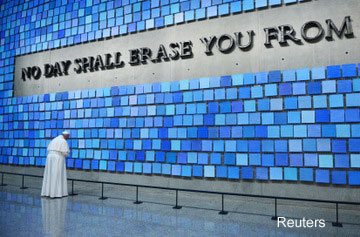 While in New York City, the pope also spoke at an interfaith prayer service at the 9/11 Memorial and prayed with the families of victims of the attacks. He expressed his grief, calling the flowing water “a symbol of our tears.” Yet, he also saw in it ripples of hope.
While in New York City, the pope also spoke at an interfaith prayer service at the 9/11 Memorial and prayed with the families of victims of the attacks. He expressed his grief, calling the flowing water “a symbol of our tears.” Yet, he also saw in it ripples of hope.
“This place of death became a place of life, too, a place of saved lives, a hymn to the triumph of life over the prophets of destruction and death, to goodness over evil, to reconciliation and unity over hatred and division. In this place of sorrow and remembrance, I am filled with hope, as I have the opportunity to join with leaders representing many religious traditions which enrich the life of this great city. I trust that our presence together will be a powerful sign of our shared desire to be a force for reconciliation, peace, and justice.”
During his apostolic journey, the pope met and celebrated Masses with bishops, priests, seminarians, and those in consecrated life. He offered encouragement to the U.S. bishops, while reminding them to stay focused on God and His people. The pope stressed the importance of ongoing dialogue with priests, laypeople, and families.
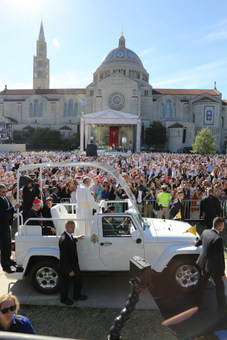 “I cannot ever tire of encouraging you to dialogue fearlessly,” he said. “Otherwise, we fail to understand the thinking of others or to realize, deep down, that the brother or sister we wish to reach and redeem with the power and closeness of love, counts more than their positions, distant as they may be from what we hold as true and certain.”
“I cannot ever tire of encouraging you to dialogue fearlessly,” he said. “Otherwise, we fail to understand the thinking of others or to realize, deep down, that the brother or sister we wish to reach and redeem with the power and closeness of love, counts more than their positions, distant as they may be from what we hold as true and certain.”
It was a theme he echoed during the canonization Mass of Junípero Serra, emphasizing that it is the mission of all Christians to evangelize and that the word of God is not meant for only a few.
“Jesus did not provide a short list of who is, or is not, worthy of receiving His message and His presence. Instead, He always embraced life as He saw it; in faces of pain, hunger, sickness, and sin; in faces of wounds, of thirst, of weariness, doubt and pity. Far from expecting a pretty life, smartly-dressed and neatly groomed, He embraced life as He found it,” Pope Francis said.
The pope said we are heirs to a missionary spirit, citing Saint Junípero as an example.
“Father Serra had a motto which inspired his life and work, not just a saying but, above all, a reality which shaped the way he lived: ‘Siempre Adelante!’ Keep moving forward. For him, this was the way to continue experiencing the joy of the Gospel, to keep his heart from growing numb,” the pontiff said.
“I love the quote he stated of Junípero Serra – ‘Siempre Adelante,’ always forward,” said Patrick Finn, a diocesan seminarian who attended the Mass. “That was really beautiful because it’s easy to get stuck in the way things were and ‘that’s how we’ve always done things.’ It was a reminder to be creative in spreading the Gospel.”
“He is asking and calling us, all Christians, all Catholics, all people to open our hearts to the compassion of serving one another and helping people who are in need. I’m like, ‘That’s Catholic Charities. That’s what we do,’” said Steve Letourneau, Catholic Charities Maine CEO, who attended some of the pope’s Washington events along with other Catholic Charities’ representatives. “We really felt, many times, that the pope was actually speaking to us and our agency and our employees, through us, because his message is certainly a unifying message with Catholic Charities. That is what we are doing throughout the country and here in Maine.”
The pope’s visit also included lunch shared with the homeless in Washington and a few lessons with students at Our Lady Queen of Angels School in Harlem. He also met with survivors of clergy sexual abuse, whom he assured of his commitment to hold accountable all clergy who abuse or fail to protect children.
“Words cannot fully express my sorrow for the abuse you suffered,” he said. “I am profoundly sorry that your innocence was violated by those whom you trusted.”
While in Philadelphia, the last stop on his journey, the pope also visited prison inmates, whom he embraced and thanked for receiving him.
“I am here as a pastor but, above all, as a brother – to share your situation and to make it my own,” the pope told the men. “I have come so that we can pray together and offer our God everything that causes us pain but, also, everything that gives us hope, so that we can receive from Him the power of the resurrection.”
The pope’s apostolic journey culminated with the 8th World Meeting of Families, which, though last on his trip, was the primary reason for it. The World Meeting of Families, held every three years, was initiated by Saint Pope John Paul II in 1992 to “look at strengthening the sacred bonds of the family across the globe.” This year’s theme was “Love is Our Mission: The Family Fully Alive.”
“The family is the living symbol of the loving plan of which the Father once dreamed. To want to form a family is to resolve to be part of God’s dream, to choose to dream with Him, to want to build with Him, to join Him in this saga of building a world where no one will feel alone,” the pope said. “The most beautiful thing that God made – so the Bible tells us – was the family.”
The pope celebrated the closing Mass of the World Meeting of Families and, the evening before, participated in the Festival of Families, an international celebration featuring musical performances, speeches, Scripture, and prayer. During the festival, families from Argentina, Australia, Jordan, Nigeria, the Ukraine, and the United States each shared their hopes and concerns.
“The pope just lit up with each of those families. They each went up, and he greeted them and embraced them, but you can see that he has such a wonderful sense of family and its importance,” said Maryanne Harrington, the director of the diocese’s Office of Lifelong Faith Formation. “And that is really where we need to be today. If families aren’t able to grow in faith, we won’t have calls to vocation; we won’t have churches that are active; we won’t reach out as a bigger family of the community of the Catholic Church. He kept saying that, and I think we really need to hear that.”
Pope Francis spoke especially about the need to care for children and grandparents and said a society cannot be healthy if it does not leave room for family life.
“We cannot think that a society has a future when it fails to pass laws capable of protecting families and ensuring their basic needs, especially those of families just starting out. How many problems would be solved if our societies protected families and provided households, especially those of recently married couples, with the possibility of dignified work, housing, and health care.”
While the pope said all families face challenges, he spoke of small gestures that can make the greatest difference. He referred to them as little miracles, saying Jesus wants us to encourage them and spread them.
“They are little signs of tenderness, affection, and compassion -- like the warm supper we look forward to at night, the early lunch awaiting someone who gets up early to go to work,” he said. “Love is shown by little things, by attention to small daily signs which make us feel at home. Faith grows when it is lived and shaped by love. That is why our families, our homes, are true domestic churches.”
“The thing I love about the pope is that he says the most profound things, but he says them in such a simple, livable way,” said Harrington. “He talked about the whole idea of love, just that happiness is found in very simple gestures and ways, and he really challenged families to see the love in everything that they do as their call to holiness.”
As profound as the pope’s words were, what may reside in our hearts the longest are the many images from his visit: infants and children being carried to him to be blessed as he drove through the streets, crowds several layers deep waving and shouting, the pope pausing during the procession at Saint Patrick’s Cathedral in New York City to bless a teenager with spina bifida, his posing for countless selfies, his solitary reflection in front of the 9/11 Memorial.
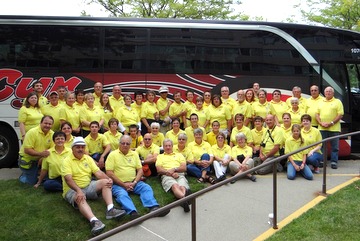
Three groups from Maine were among the hundreds of thousands who traveled to see the pope. Despite long waits and tight security, they describe it as a grace-filled experience.
“When we thought he might be coming our way, words could not explain the excitement I felt inside. So close but yet so far. But just being there has filled my children and [me] with graces and feelings we won't soon forget,” said Kathleen Lagasse, who participated in a trip organized by the Knights of Columbus in Grand Isle.
“I felt like what it must have been like in the time of Christ, to have all those people come to see Christ,” said Lee Street, from Our Lady of Perpetual Help, Windham, who attended the Mass at the World Meeting of Families as part of the diocesan pilgrimage. “And then, when we got the Eucharist, it was like the loaves and fishes. I thought, ‘That’s the closest I’ll ever get to sort of knowing what that experience was like.’ I found it very moving.”
“To see all these people crying, yelling, screaming, clapping, and with hands stretched out to receive the host, it felt like people were just craving to receive Jesus, and seeing all these priests distributing Communion was overwhelming and fantastic,” said Linda Ayotte of Our Lady of the Valley Parish, Saint Agatha.
“We had a spiritual communion with everyone around us, and that was very wonderful,” said Sharyn Lipski, from Saint Peter the Fisherman Parish, Machias.
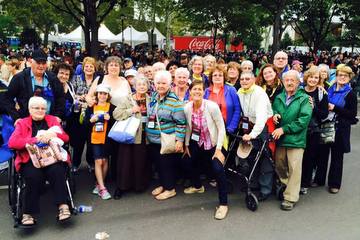 “It was just being there with so many people and feeling the oneness and knowing that these were all God’s people. We were all thirsting for His love, and we felt it,” said Joanne Yacono-Brandt of St. Paul the Apostle Parish.
“It was just being there with so many people and feeling the oneness and knowing that these were all God’s people. We were all thirsting for His love, and we felt it,” said Joanne Yacono-Brandt of St. Paul the Apostle Parish.
“The pope has brought us together and shown us how we need to bring people together,” said Jim Finn of All Saints Parish.
“The whole trip was touching. The love that was generated there, you can’t ask for anything better,” said Elodia Young, also of All Saints.
The pilgrims say having the opportunity to see the pope will inspire them as they return to their homes and parishes.
“It’s going to impact me as far as trying to be even more humble, more giving more compassionate,” said Connie Pomerleau from Saint Michael Parish, Augusta.
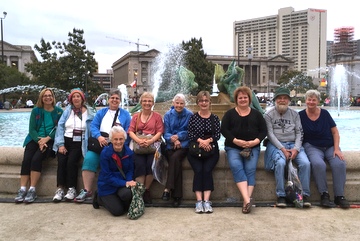
As the pope was leaving Philadelphia, he assured Americans of his continued prayers and, as he had done throughout the trip, requested their prayers for him.
On the flight home, the pope was asked about being viewed as a celebrity during the trip. He responded by saying, “Do you know what title the popes used to use and should still use? ‘Servant of the servants of God.’ That is a little different than being a celebrity, a ‘star.’… How many stars have we seen shine, then go out and fall. It is something fleeting. Whereas, being the servant of servants of God, that is something beautiful. It doesn’t pass away. That is what I think.”
Photos of Pope Francis are courtesy of George Martell from the Archdiocese of Boston.










